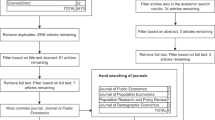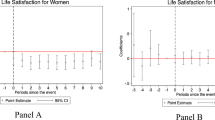Abstract
NATIONAL existence is to a large extent dependent upon the quantitative value of the population, and diminution of population is the downward path which, if continued, must eventually lead to national extinction. The population of any country is the resultant of the balance between births and deaths and between emigration and immigration. In the British Isles, while emigration is a material factor in reducing population, the principal influence securing its continuous increase is the excess of births over deaths.
This is a preview of subscription content, access via your institution
Access options
Subscribe to this journal
Receive 51 print issues and online access
$199.00 per year
only $3.90 per issue
Buy this article
- Purchase on Springer Link
- Instant access to full article PDF
Prices may be subject to local taxes which are calculated during checkout
Similar content being viewed by others
References
See “Report on Maternal Mortality in connection with Child-bearing and its Relation to Infant Mortality” (Rep. of the Med. Officer of the Loc. Gov. Board) for many of the data and details mentioned in this article.
“Infant mortality” is the number of deaths of infants during the first year of life per 1000 births.
See “Maternity and Child Welfare.” By E. J. Smith . (P. S. King and Co.) Price 1s. net.
Rights and permissions
About this article
Cite this article
HEWLETT, R. Mothercraft and Infant Welfare . Nature 96, 482–483 (1915). https://doi.org/10.1038/096482a0
Issue Date:
DOI: https://doi.org/10.1038/096482a0
Comments
By submitting a comment you agree to abide by our Terms and Community Guidelines. If you find something abusive or that does not comply with our terms or guidelines please flag it as inappropriate.



